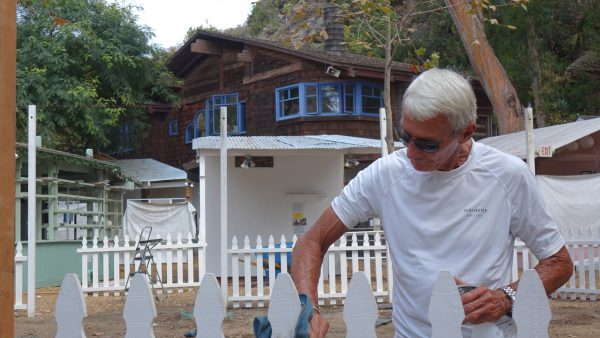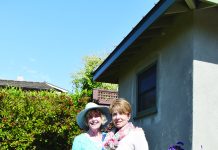
U.S. Marine Corps veteran Thomas Crivella put his sweat into Heisler Park as a maintenance worker for the Laguna Beach Parks and Recreation during the 1970s.
More recently, a 2018 stint as a seasonal maintenance worker for the OC Fire & Event Center put him to work repairing hundreds of irrigation lines across the fairgrounds. But he eventually found himself laid off with other employees who were making $25 per hour.
Before the pandemic’s outbreak, Crivella, 72, found himself out of work again and quickly burned through his savings. He was forced to move out of the Costa Mesa apartment he shared with a roommate and started couch surfing with friends. He feared wearing out his welcome as a house guest.
Then he met Friendship Shelter staffer Dylan Heath in Laguna Canyon. Crivella started living at the Alternative Sleeping Location shortly after and a case worker is helping him find a new apartment.
“If you try to do that on your own with no place to go and no resources, you’d be paddling up a creek with no paddle,” Crivella said.
The Sawdust Art Festival staff learned about his background in horticulture and offered him a part-time job as a maintenance worker in July. He’s now working there full-time but continues to sleep at the ASL until he can find an apartment he can afford that’s somewhat close to his job.
Crivella is just one of hundreds of homeless individuals or people living in unstable housing circumstances who are currently supported by Friendship Shelter.
With the backdrop of a pandemic and economic downtown, Friendship Shelter reported more progress in toward ending Orange County homelessness in 2020 than during any other year in its 33-year history.
Funding from the federal COVID-19 response plan is creating a “transformational opportunity” for the Laguna Beach nonprofit. Specifically, the organization is actively working to get Federal Emergency Housing vouchers into the hands of 100 interested homeless individuals by June 2022.
“For the past 18 months we’ve navigated these challenging times in the same way we approach our work: one person at a time,” Executive Director Dawn Price said. “Our work moving people out of homelessness and into permanent housing is more important now than ever before.”
Price described the recent infusion of federal funding for housing vouchers as “a once-in-a-lifetime opportunity.”
Friendship Shelter is a partner in a sprawling network of Orange County public agencies and nonprofits, tag-teaming to confront one of the most controversial socio-political issues facing the region.
Homelessness is caused primarily by lack of sufficient income or job loss combined with high costs of housing in Orange County, according to a 2017 study by UC Irvine researchers in collaboration with Orange County United Way and Jamboree. Family dysfunction, health, and substance abuse also increase one’s vulnerability to homelessness.
Laguna Beach has been considered a leader among Orange County cities for years because of its partnership with Friendship Shelter in operating the Alternative Sleeping Location in Laguna Canyon. While other cities in South Orange County balked at hosting homeless shelters or even helping fund them—a practice now effectively banned by the federal courts—Laguna has dedicated city land and tax dollars toward solutions for years.
But the nonprofit’s work extends far beyond case workers attempting to get someone off the street.
In February, the County of Orange contracted with Friendship Shelter for Coordinated Entry System Services for individuals at-risk of becoming homeless or already experiencing homelessness to needed services and housing. The agreement comes with about $1 million in funding for Friendship Shelter coordinated programs provided through June 2023.
Separately, the County has contracted Friendship Shelter for the provision of Project Toolbelt in South Orange County. The Toolbelt assistance program was the county’s replacement for a program that paid for motels for homeless people vulnerable to COVID-19 in group housing. The intent is to transition people from emergency housing to more permanent apartments.
As of Tuesday, Friendship Shelter’s collaboration with Project Toolbelt, has resulted in 56 people being placed into permanent housing, 48 people placed into temporary housing, and 10 people placed into emergency shelter, according to the Orange County Health Care Agency.
“The County of Orange appreciates the strong, collaborative relationship it has with Friendship Shelter for these services,” Douglas Becht, acting director for Orange County’s Office of Care Coordination, said in a prepared statement.
Friendship Shelter is an Orange County pioneer in advocating for data- and trauma-informed care, which has become a national best practice for those working to end homelessness, said Becks Heyhoe, executive director United to End Homelessness at Orange County United Way
“I would say that Friendship Shelter has a tremendous reputation across the county in terms of their ability to be creative thought leaders and be careful about how we talk about homelessness,” Heyhoe said.
She also described Price specifically as a fearless leader in changing the region’s practices even when it meant discussing racial inequality in a county with a deeply conservative history.
Even with all of the institutional support via Project Toolbelt, Crivella and his case worker have struggled to get him into a new apartment due to a shortage of affordable housing in Orange County has been challenging.
He was talking with a landlord about renting a studio in Laguna Beach for $1,200 per month. But the owner decided on a higher rent that he couldn’t afford. Now Crivella is looking at Irvine apartments but he’s concerned about a long commute to work via bus. Friendship Shelter may be able to provide some of the cash Crivella would need to buy a used car.
Despite these financial hurdles, Crivella is staying focused on helping build Santa’s house for Sawdust’s upcoming Winter Fantasy. On Wednesday, he was busy cleaning a picket fence that’s been in storage for two years due to COVID-19.
“I’ve become a part of society, not a burden on society, and it’s all because I’ve been staying at the ASL,” Crivella said.




